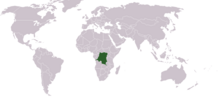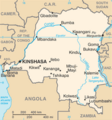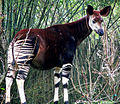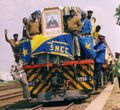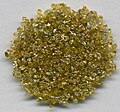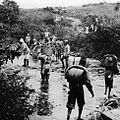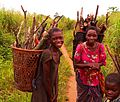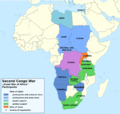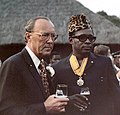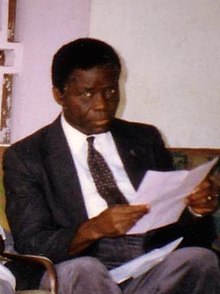Portal:Democratic Republic of the Congo
The Democratic Republic of the Congo Portal
The Democratic Republic of the Congo (also abbreviated as DR Congo,DRC, the DROC, and RDC (in French)) is a country in Central Africa. By land area, the DRC is the second-largest country in Africa and the 11th-largest in the world. With a population of around 105 million, the Democratic Republic of the Congo is the most populous Francophone country in the world, and the fourth-largest in Africa. The national capital and largest city is Kinshasa, which is also the economic center. The country is bordered by the Republic of the Congo, Central African Republic, South Sudan, Uganda, Rwanda, Burundi, Tanzania (across Lake Tanganyika), Zambia, Angola, the Cabinda exclave of Angola, and the South Atlantic Ocean. Centered on the Congo Basin, the territory of the DRC was first inhabited by Central African foragers around 90,000 years ago and was reached by the Bantu expansion about 3,000 years ago. In the west, the Kingdom of Kongo ruled around the mouth of the Congo River from the 14th to 19th centuries. In the northeast, center, and east, the kingdoms of Azande, Luba, and Lunda ruled from the 16th and 17th centuries to the 19th century. King Leopold II of Belgium formally acquired rights to the Congo territory from the colonial nations of Europe in 1885 and declared the land his private property, naming it the Congo Free State. From 1885 to 1908, his colonial military forced the local population to produce rubber and committed widespread atrocities. In 1908, Leopold ceded the territory, which thus became a Belgian colony. Congo achieved independence from Belgium on 30 June 1960 and was immediately confronted by a series of secessionist movements, the assassination of Prime Minister Patrice Lumumba, and the seizure of power by Mobutu Sese Seko in a 1965 coup d'état. Mobutu renamed the country Zaire in 1971 and imposed a harsh personalist dictatorship until his overthrow in 1997 by the First Congo War. The country then had its name changed back and was confronted by the Second Congo War from 1998 to 2003, which resulted in the deaths of 5.4 million people. The war ended under President Joseph Kabila, who governed the country from 2001 to 2019, under whom human rights in the country remained poor and included frequent abuses such as forced disappearances, torture, arbitrary imprisonment and restrictions on civil liberties. Following the 2018 general election, in the country's first peaceful transition of power since independence, Kabila was succeeded as president by Félix Tshisekedi, who has served as president since. Since 2015, the Eastern DR Congo has been the site of an ongoing military conflict in Kivu. The Democratic Republic of the Congo is extremely rich in natural resources but has suffered from political instability, a lack of infrastructure, corruption, and centuries of both commercial and colonial extraction and exploitation, followed by more than 60 years of independence, with little widespread development. Besides the capital Kinshasa, the two next largest cities, Lubumbashi and Mbuji-Mayi, are both mining communities. The DRC's largest export is raw minerals, with China accepting over 50% of its exports in 2019. In 2021, DR Congo's level of human development was ranked 179th out of 191 countries by the Human Development Index and is classed as a least developed country by the UN. , following two decades of various civil wars and continued internal conflicts, around 600,000 Congolese refugees were still living in neighbouring countries. Two million children risk starvation, and the fighting has displaced 4.5 million people. The country is a member of the United Nations, Non-Aligned Movement, African Union, COMESA, Southern African Development Community, Organisation Internationale de la Francophonie, and Economic Community of Central African States. (Full article...) Selected article - Although the Democratic Republic of the Congo (DRC) has Africa's largest freshwater resources, it is suffering from an acute drinking water supply crisis. The DRC has one of the lowest rates of access to clean drinking water in Sub-Saharan Africa and the world. Only 46 percent of the population had access to an improved drinking water source in 2012. Furthermore, the sanitation coverage was estimated at only 31 percent in 2012. Up to date and accurate information on water supply and sanitation services in the DRC is scarce. As a result of inadequate water supply and sanitation services, many inhabitants are suffering from waterborne diseases, including diarrhoea, typhoid, and cholera. The current water crisis is a result of the deteriorated state of the water infrastructure due to underinvestment in the water sector and conflict-related destruction as well as the rapid growth of the population, which was estimated at 4 percent in urban areas and 2.5 percent in rural areas by the World Bank in 2009. Overall, the DRC's water supply and sanitation sector is characterized by several overlapping and conflicting institutional jurisdictions. Therefore, the water crisis in the DRC can be categorized as an economic water scarcity problem, hindering development in the country. Article 48 of the 2006 Constitution of the DRC recognizes the human right to water. The rehabilitation and development of the water sector is a priority to which the national government committed itself in the Growth and Poverty Reduction Strategies and to which it agreed as part of the international framework of the UN Millennium Development Goals. (Full article...)General images -The following are images from various Democratic Republic of the Congo-related articles on Wikipedia.
This is a Good article, an article that meets a core set of high editorial standards.
 The Free Republic of the Congo (French: République Libre du Congo), often referred to as Congo-Stanleyville, was a short-lived rival government to the Republic of the Congo (Congo-Léopoldville) based in the eastern Congo and led by Antoine Gizenga. Following Prime Minister Patrice Lumumba's deposition in September 1960 in the midst of the Congo Crisis, many of his supporters became disillusioned with the government in Léopoldville (modern-day Kinshasa). Under Lumumba's deputy, Antoine Gizenga, leftists organised in Stanleyville (modern-day Kisangani) and in December declared their own government to be the legal successor to the prime minister's administration. Gizenga quickly amassed military strength and, by February 1961, had occupied vast portions of Congolese territory. In August, negotiations between the two governments resulted in Gizenga agreeing to stand down. He returned to the office of deputy under the new prime minister, Cyrille Adoula. Still, Gizenga distanced himself from the central administration and rebuilt his own political and military power. The rival government was not fully reintegrated into the Republic of the Congo until Gizenga was arrested in January 1962. (Full article...)
This is a Featured article, which represents some of the best content on English Wikipedia..
Marcel Antoine Lihau or Ebua Libana la Molengo Lihau (29 September 1931 – 9 April 1999) was a Congolese jurist, law professor and politician who served as the inaugural First President of the Supreme Court of Justice of the Congo from 1968 until 1975, and was involved in the creation of two constitutions for the Democratic Republic of the Congo. Lihau attended the Catholic University of Leuven in Belgium with the help of sympathetic Jesuit educators, becoming one of the first Congolese to study law. While there he encouraged Congolese politicians to form an alliance that allowed them to secure the independence of the Congo from Belgium. He served briefly as a justice official and negotiator for the Congolese central government before being appointed to lead a commission to draft a permanent national constitution. He was made dean of law faculty at Lovanium University in 1963. The following year he helped deliver the Luluabourg Constitution to the Congolese, which was adopted by referendum. (Full article...)
WikiProjectsTopicsCategoriesRelated portalsAssociated WikimediaThe following Wikimedia Foundation sister projects provide more on this subject:
Discover Wikipedia using portals | ||||||||



